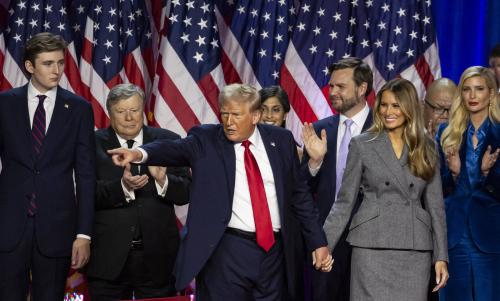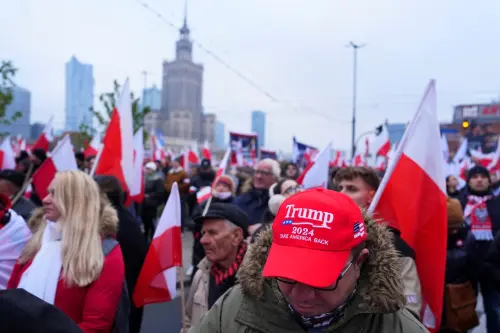The media focus on the Islamic State has taken the spotlight off another powerful Middle East rebel and terrorist group that also controls territory and acts like a state: Lebanese Hezbollah. In recent testimony before the House Committee on Foreign Affairs’ Subcommittee on the Middle East and North Africa, Dan Byman, a senior fellow and director of research in the Center for Middle East Policy, described the ongoing transformation of Hezbollah—particularly since it entered the Syrian civil war—and the implications for the region and the United States.
The effects of war
Byman noted that Hezbollah had been evolving even before the Arab Spring rocked the region. The organization has maintained its hostility toward Israel and the United States, according to Byman. But as the group became a dominant player in Lebanese politics and society in recent decades, it has gradually shifted away from the goal of importing an Iranian-style Islamic revolution.
As a close ally of Iran—which continues to provide substantial assistance, support, and advice—Hezbollah was threatened by the uprising against Iran’s other regional ally, Bashar Assad. However, Byman argued the war in Syria has been costly for the organization. In the past five years of fighting, Hezbollah has suffered at least 1,000 casualties, which has forced it to expand its recruitment. According to Byman, the Syrian civil war is also straining Hezbollah’s position in Lebanon—spillover, in the form of refugees and sectarian radicalism, has upset the tenuous peace in the fractious nation. Byman warned of the growing regional divide between Shiites and Sunnis triggering renewed sectarian conflict in Lebanon, which would seriously threaten the already-stretched Hezbollah.
Decline in popularity
Hezbollah had long been one of the most popular entities across the Arab and Muslim world. But as Byman testified, the Syrian civil war has had a transformative effect on Hezbollah’s public image. Although Hezbollah was established to fight for the interests of the Lebanese Shiite community during the Lebanese civil war, the organization’s primary objective was expelling the occupying Israelis, which it accomplished in 2000. This made Hezbollah widely popular across the Arab and Muslim world, as Byman noted. It’s also garnered particular support within Lebanon by providing social services to communities beyond its constituent Shiites.
In Byman’s view, supporting the Assad regime in what quickly became a sectarian civil war has been disastrous for Hezbollah’s desired reputation.
In Byman’s view, supporting the Assad regime in what quickly became a sectarian civil war has been disastrous for Hezbollah’s desired reputation as an Islamist resistance movement fighting Zionist and Western enemies. As one of the most militarily effective groups fighting for Assad and Iranian interests, Hezbollah has become vilified throughout the Sunni world. He added that the recent Gulf Cooperation Council and Arab League designations of Hezbollah as a terrorist organization, notwithstanding Hezbollah’s long history of terrorism, illustrate this significant shift in regional perceptions.
A persistent, yet distracted menace
While Byman argued Hezbollah will likely continue to be preoccupied with the fighting in Syria and possibly securing an increasingly unstable Lebanon, he maintained the organization remains a latent threat to Israeli and American interests. He judged it unlikely that Hezbollah would renew, in the short term, its conflict with Israel considering its current deployments in Syria, but warned that “setbacks in Lebanon or elsewhere would give the group an incentive to restore its past reputation, and fighting in Israel is one potentially popular way of doing so.”
Another possible trigger Byman noted is a breakdown of the U.S.-Iranian nuclear agreement. In the event of any confrontation with Iran, he argued “we should expect Hezbollah to stand by its Iranian ally.” Hezbollah remains a potent threat capable of supporting Shiite militias, conducting global terrorist operations, and, launching its enormous missile arsenal against Israel.
Once again, no easy solution
For the United States, the situation is complicated. The United States cannot condone Hezbollah’s growing influence and power, Byman argued, acknowledging: “Hezbollah is one of the most formidable foes of the Islamic State at a time when the United States is both trying to fight the group in Syria and stop the violence from spreading to Lebanon.” Byman offered three recommendations that will potentially limit Hezbollah’s threat to core American interests without risking a mutually undesired conflict:
- First, the United States should continue to work toward strengthening a unified and independent Lebanese Armed Forces, which includes lobbying Saudi Arabia to restore its recently rescinded $4 billion annual aid package.
- Second, the United States should lead an increased aid effort for the Syrian refugees in Lebanon in the hope of averting the potentially catastrophic spillover of violence.
- Finally, the United States should continue its longstanding support for Israel to maintain its deterrence of Hezbollah and work to ensure there is no escalation of violence.
Hezbollah remains a powerful organization and a critical ally of Iran, Byman stressed, adding that its missile arsenal and experienced, professional (though likely overstrained) cadre represent a continued threat to Israel and the United States. Yet at the moment, according to Byman, Hezbollah is primarily preoccupied by Syria and the wider regional sectarian conflagration, a situation unlikely to be improved by renewing hostilities with either Israel or the United States.


Commentary
How has the Syrian civil war affected Hezbollah, and what should the U.S. do?
April 1, 2016